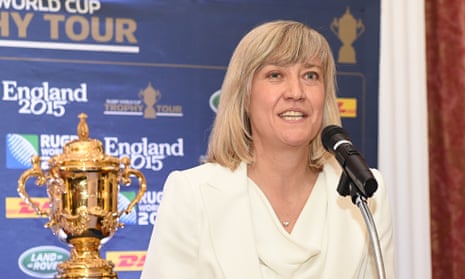The chief executive of England Rugby 2015, the subsidiary that will deliver the Rugby World Cup later this year, hosted guests at a packed Twickenham as usual last Saturday amid the mayhem of England’s breathless climax to the Six Nations.
Afterwards, Debbie Jevans spoke with enthusiasm about how the helter-skelter denouement would stoke enthusiasm still further with the World Cup in September drawing closer, and give an extra push to the last batch of ticket sales, due to go on the market this week following returns from international fans and sponsors.
There was no hint then, nor when she cancelled through illness a scheduled appearance on Thursday to launch a trophy tour that will travel the land for 100 days before arriving at the opening match between England and Fiji on 18 September, that she would have resigned by the end of the week citing personal reasons.
Despite the mystery surrounding her departure Jevans, who will remain on the boards of the Football League and Sport England, leaves behind an organisation in good shape to deliver an event often described as the third biggest in the sporting world.
It was London 2012, where Jevans was director of sport, that cemented the reputation of the former professional tennis player. She had been one of the tight unit who saw through the entire project from the inside, having joined the bid team in 2003 and helped pilot the Olympic Games through to its happy conclusion nine years later.
But leading an organisation is a very different matter and there was pressure on her when she was parachuted in by the then-newly appointed Rugby Football Union chief executive Ian Ritchie to replace the popular Paul Vaughan.
There was early scepticism from the rugby community at a “Locog takeover” and over the use of football stadiums to drive up the total number of tickets available in order to meet World Rugby’s £80m minimum guarantee and, argued Jevans, deliver maximum legacy benefits.
But that soon dissipated as it became clear that adapting the Locog template, from a trophy tour that apes the torch relay to the recruitment of 6,000 volunteers and 15 fanzones around the country that will host 1m supporters and are designed to stoke enthusiasm beyond the stadiums, would deliver.
She has also promised to learn from the mistakes of London 2012, working with the RFU to deliver a meaningful legacy in terms of popularity and participation. Ticket sales have been remarkably strong, despite some grumbles over high prices, and the technology behind them has held up. Already 1.9m of the 2.3m total have been shifted, amid confidence the event will sell out.
One of her biggest early decisions was to pursue the use of stadiums such as the Olympic Stadium and Wembley to complement Twickenham and the Millennium Stadium and ensure as many people could experience the tournament as possible. Jevans argued that expensive tickets for the biggest games would help subsidise cheaper offerings in the group stages and her confidence in that model appears to have been borne out.
One fly in the ointment was her failure to persuade the government to pass specific anti-touting laws, meaning that many tickets have already made their way to secondary sites at a high mark-up. But the introduction of the consumer rights bill in the summer, which will allow sports’ governing bodies to cancel tickets under their terms and conditions if they believe they are being sold at a vastly inflated price, should help.
The 54-year-old’s achievements to date have made her a sought-after property in sports administration circles and she was named the most powerful woman in British sport by the Guardian last year. She was linked with the FA chief executive’s job that eventually went to Martin Glenn but had not given any clues as to her plans beyond the final in October.
With the overall structure long in place the main challenges, aside from shifting the stubborn final few tickets for some of the more unattractive ties, are logistical. Jevans has repeatedly said that she wants the 2015 World Cup to be the best ever. It is one she will now experience as a fan rather than from the bridge.
